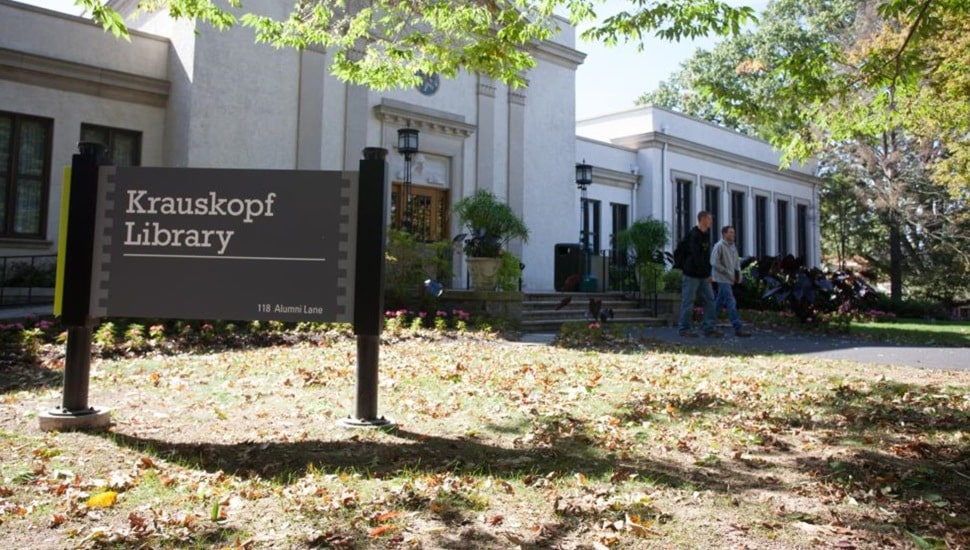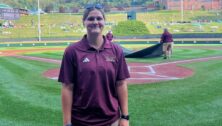DelVal Receives Grant from National Film Preservation Foundation to Preserve Two Archived Films

Delaware Valley University has received a grant from the National Film Preservation Foundation (NFPF) to fund the preservation of two 16mm acetate films from the university’s archives.
The first film, dated 1953-1954, is titled The National Agricultural College and provides a glimpse into the life at the National Agricultural College (NAC) in the years shortly after its accreditation as a four-year college. The second film, untitled, contains footage of a football game played in 1960 between Delaware Valley College of Science and Agriculture (DVC) and King’s College. DelVal won, 14-0.
These are the first films preserved for the university by the NFPF. The films were chosen for preservation because they document an important era in the school’s history.
The National Agricultural College was made in 1953-1954, five to six years after the school received accreditation and transitioned from the National Farm School (NFS) and Junior College to the NAC. This transition was led by NFS alumnus and then-president James Work, Class of 1913. The growth of the school mirrored the growth of the U.S. post-war economy and advances in agricultural production. The school’s mission was to educate young men in practical scientific agriculture who would go on to use their education to feed the world.
This mission is directly tied to the school’s founding principle of science with practice and is today manifested in Delaware Valley University’s award-winning experiential learning program, E360. In scene after scene, the narrator highlights the practical nature of an NAC education, both in the classroom and in the field. Students are shown operating agricultural machinery, such as cultivators and tractors, as well as conducting scientific experiments under the watchful eye of chemistry professor Dr. Jesse Elson, Class of 1932.
In addition to Elson, the film features several NAC instructors, as well as noted microbiologist Albert Schatz, who, as a graduate student working under Nobel laureate Selman Waksman, isolated Streptomycin from the soil actinobacterium Streptomyces griseus. At the time the film was made, the area surrounding the college was still largely agricultural, hence the establishment of the Pennsylvania Poultry Diagnostic Laboratory on the college campus. The lab, featured in the film, fostered the school’s mission of practical agriculture while serving local poultry farmers.
Football has a long history at DelVal. A football team was formed as early as 1898 and continues to this day. The 1960s were years of growth for the football team after cuts to the program in the previous decade. In the 1950s, the school was trying to determine if football had a place at the institution due to the expense of running the program and the difficulty of recruiting top-caliber players, given that the school did not offer incentives such as scholarships. At the time, President Work did not want to support a team if it was not a winning one. By 1960, that changed when the team went 4-3-1. After dismissing coaches in the early 1950s and relying on faculty to coach the team, by 1960, there were four members on the coaching staff, only two of whom were on the school’s faculty.
Taken together, both films provide a glimpse into the growth of the school and serve as a midpoint in its history thus far. These films link digitized footage, circa 1920, of Dr. Joseph Krauskopf visiting the school (then the National Farm School) to DelVal’s recent appearance on the Amazon Prime series, The College Tour. The films give life to and complement documents, publications, and photographs from the 1950s and 1960s that are housed in DelVal’s archives. Additionally, they record the school’s rapid growth following the Great Depression and World War II.
A unique aspect of this grant is that in addition to digitization, it requires the creation of a new film in the same format as the original, in this case, 16mm. The NFPF seeks to preserve not just the content but the format of a piece. Similar groups will fund the digitization of films and videos but not the reproduction of them in their original format.
Learn more about Delaware Valley University’s archived history.
Join Our Community
Never miss a Delaware County story!
"*" indicates required fields




















![95000-1023_ACJ_BannerAd[1]](https://delco.today/wp-content/uploads/sites/3/2023/03/95000-1023_ACJ_BannerAd1.jpg)











